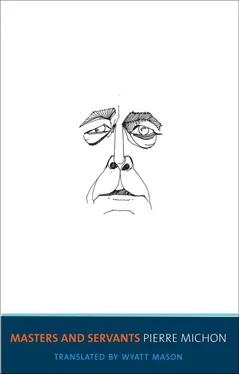The old man reflected.
He tried to imagine what Vincent would have said. He remembered, perhaps word for word, from what he had written to Théo in February of’88, having just seen Vincent for the last time and not having known it: “When I left him, I told him I will still come to see him, and he told me that we would see each other up above and through his mannerisms I understood that he was saying a prayer.” Roulin, who wasn’t in the habit of praying, thought that perhaps in this prayer the other was asking that he see once again the Zundert of his birth; that Théo be alerted in time to pay for the coffin; that his work not be completely forgotten, debacle that it was, and that later on, at least some young painter, exalted and unfortunate, would admire him as he had admired Monticelli, for after all, he was no Rembrandt; yet he dared to demand, perhaps, that a miracle be performed up above, and that in the eyes of a few he might pass for Rembrandt. He asked that his paintings be seen by those who would know how to look at them. But of course he didn’t ask God that Roulin’s portrait, given to Roulin, stay forever in the Roulins’ kitchen.
He took into account all the money he had been offered. He had a little garden, the children were grown; as for the hooch, getting loaded takes less time than it used to and always comes at a fixed price, his salary sufficed. And what could you buy? Everything, once you had learned how; but that wasn’t the case with him. He saw a big house along the bank of the Belsunce, or in the Meilhan lanes, behind the plane trees ventilated by the night; but how to furnish it with just the buffet, the myna bird, and his body that was heavy but not particularly important, and what do you tell the neighbors, the ship owners, the prefects? He thought about pretty girls who were more expensive and prodigious than the oyster girls, girls one doesn’t buy for three francs and a blow, but with louis d’or and dollars and bundles of words he didn’t know, the great white beasts almost like the oyster girls that you use the same way, that you strip and touch, whose loins you hold just the same, inside of whom you have the same great shudder, and who, just the same, get dressed and leave: Vincent would have been so happy to have them, he who went without eating for rue des Recollettes . Théo paid for that as well, not just for the tubes of yellow and the supposed bare minimum to live on, and it was fair that Théo foot the bill. But it was too late, Roulin could no longer replace Vincent in such an endeavor, he was too old now. What else could one really buy? Trinkets, a convertible, a cargo boat? But what would you do with it unless, in place of your own, you had a white hat, and you knew about navigation? You could go up to Paris; into Tunisia as well, even though Armand said that it’s the filthiest little province in the universe. You can’t buy youth in Lambesc under the Empire; or a rejuvenated Augustine; you can’t buy la Sociale . And even if you could, what would you do with it, now?
He thought about this Parisian, who was a good boy after all, who was only half fleecing him when he could have taken him whole. This man didn’t owe Roulin anything. And perhaps it was Roulin who owed him something; without him, Roulin could have died with the belief that he had been seeing things a long time ago in Aries, that what he had seen in the melon fields, for all its formidable violence, had been nothing out of the ordinary, wasn’t some fabulous suffering that deserved to be rewarded no matter what the outcome, and was no longer the incarnation of who-knows-what powerful will that makes princes out of men; he could have died believing that he had seen the gesticulations of a crackpot with sunstroke, something as exaggerated and ridiculous as the trumpets from Aida suddenly resonating from a brass band on a lawn where the retired come to play. To this young man he owed having known a great painter, having seen and touched something that was in many ways invisible, not just a miserable soul to whom one gives preserves. And this young man who had learned to make good use of money, as one could see from his jacket, his gestures, his kindness, would be better able to benefit from this painting of theirs; it would be of more profit to him. Sure he was a bit of a crook, but they all are: and Roulin, after he had reflected as I have said, and as any man could have perceived after a few illuminations, true or false, Roulin suddenly realized that the other only stole from the very rich who anyway had the means; from those superlative citizens who become enamored of that which they are told they should be enamored, whom we call les amateurs; and of course, that he was even giving them a kind of pleasure, however perverse — having convinced them that Vincent’s runes were only understandable to them — he bestowed these things upon them against their weight, in gold; and when they brought their fat weights back to their homes from the steel mills, sitting in front of the wall where an imperial, untouchable Marie Ginoux rushed forward, a zouave wearing an imperial red culotte, imperial wheat at the outskirts of Aries — they took great pleasure in possessing these things, these things that escaped them even in their homes, filling them with suffering and a great suppressed rage. And this crookedness amused the republican prince in Roulin. But he was just an old, radical postman: it could be that he hadn’t thought that far; perhaps he had just admitted that he really liked this little capitalist, because, of course, the dollars — the businesses that starve the poor world — he was against all that, but when it’s all incarnated before you in the form of a charming man who does you no real harm, it’s not that easy: even for dollars he was becoming tolerant and unconvinced. He asked for forgiveness from Blanqui’s fading portrait. He looked at the tricolor atop la Vieille Charité and perhaps he no longer saw within its folds, as he usually did, a flag of one color charged with putting an end to evil, billowing over our paradise with the help of the beast representing History, as Tarascón is represented by la tarasque , the dragon that pestered her until a saint drove it away, Tarascón where la tarasque waits no longer, the patient beast, blind and fossorial, impotent, the old crone in Marx’s coat of arms.
So the young man returned one last time and dined. At the end of the meal, the postman took on a serious air, as wily as a muzhik about to drive off with his boyar, and said that they were to talk business; there was a silence; the young man was smiling slightly; Roulin began; he was giving the painting, on the condition, however, that people knew that it had been given, by the artist himself, to Monsieur Joseph-Etienne Roulin, something which, for example, could be engraved on the edge of the frame; and he was giving the frame as well; this he added while laughing, but he worried that it might be refused, just as he hoped that this gift be reported in the Aries Forum républicain —and why not in a Parisian paper? — since van Gogh was famous now and since the young man had some connections: he wanted to boast a little. I believe in little else but the bright joy that illuminated the dandy’s eye; Roulin had seen something dance there not unlike Fouquier’s look at having taken a head, and suddenly in the top hat he saw Fouquier’s great cocked hat, black as well, but plumed; and I’m sure that this wasn’t the look the young man had, it wasn’t that hat he was wearing: he was an easy-going guy, a dealer. He smiled and laughed because he was moved. Of course he stood and embraced them. They drank. To mark the moment, Roulin stood before his Saint Abbacyr, still hanging on the wall, and sang a Marseillaise or an old topman’s tune, Jean-François de Nantes , his voice strong, his Asshurian beard, plastered down when singing the low notes, his eye peering far past Notre-Dame de la Garde and the blue line of the Vosges toward the paradise of the Beaux Arts; the myna bird was thrilled by all of this. When very late the young man tipsily descended the stairs and left down rue Trigance with his painting under his arm; when with his head lifted toward the stars he ran joyously in the deserted night, the air whistling in his ears, he thought he heard next to him, above him, above the colossal and hollow mass of la Vieille Charité , in every way lost deep in the black, an enormous flight of swallows frolicking and filling the night.
Читать дальше












